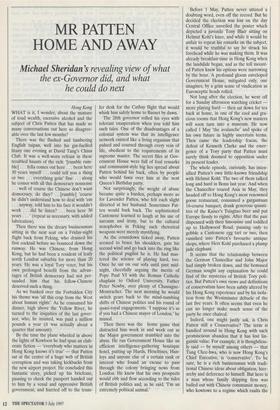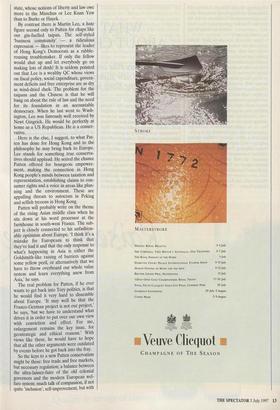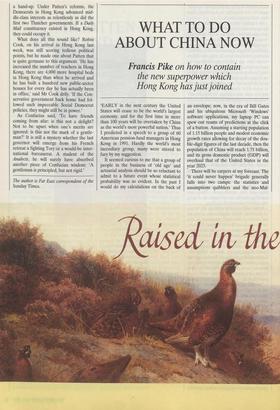MR PATTEN HOME AND AWAY
Michael Sheridan's revealing view of what
the ex-Governor did, and what he could do next
Hong Kong WHAT is it, I wonder, about the mixture of loud wealth, excessive alcohol and the subject of Chris Patten that has made so many conversations out here so disagree- able over the last few months?
There was the flushed and lumbering English taipan, well into his gin-fuelled litany one evening at David Tang's China Club. It was a well-worn refrain in these troubled haunts of the rich: `[rumble rum- ble] . . . fella comes out here . . . been here 30 years myself . . . could tell you a thing or two . . . everything goin' fine . . . along he comes with all this democracy nonsense . . . well of course the Chinese don't want democracy, do they? ... [rumble] 'course he didn't understand how to deal with 'em . . . anyway, told him to his face it wouldn't work . . . did he listen? . . . been here 30 years . . . ' (repeat as necessary, with added lubrication).
Then there was the dreary businessman sitting in the next seat on a Friday-night flight back from Peking, who drained his first cocktail before we bounced down the runway. He was Chinese, from Hong Kong, but he had been a resident of leafy north London suburbia for more than 20 years. He was a loyal Tory voter, but his own prolonged benefit from the advan- tages of British democracy had not per- suaded him that his fellow-Chinese deserved such a thing.
As we banked over the Forbidden City his theme was 'all this crap from the West about human rights'. As he consumed his dinner, high above the Yellow River, he turned to the iniquities of the last gover- nor, who, he insisted, was paid a million pounds a year (it was actually about a quarter that amount).
By the time the plane wheeled in above the lights of Kowloon he had spun an elab- orate fiction — 'everybody who matters in Hong Kong knows it's true' — that Patten sat at the centre of a huge web of British corruption and was taking kickbacks from the new airport project. He concluded this fantastic story, picked up his briefcase, pausing to check the passport handed out to him by a venal and oppressive British government, and hurried off to the trans- fer desk for the Cathay flight that would whisk him safely home to Barnet by dawn.
The 28th governor rolled his eyes with tolerant exasperation when you told him such tales. One of the disadvantages of a colonial system was that its intelligence network existed like a living organism that pulsed and coursed through every vein of life, obedient to the requirements of its supreme master. The secret files at Gov- ernment House were full of foul remarks and communist-style big lies spread about Patten behind his back, often by people who would fawn over him at the next Queen's Birthday party.
Not surprisingly, the weight of abuse became quite a burden, perhaps more so for Lavender Patten, who felt each slight directed at her husband. Sometimes Pat- ten would bark back. The sophisticated Cantonese learned to laugh at his use of sarcasm and irony, but to the cultural xenophobes in Peking such rhetorical weapons were merely mystifying.
As the countdown ticked away, Patten seemed to brace his shoulders, gain his second wind and go back into the ring like the political pugilist he is. He had mas- tered the science of playing hard, too. Once he sat on our sofa until past mid- night, cheerfully arguing the merits of Pope Paul VI with the Roman Catholic chaplain to Oxford University, Father Peter Newby, over plenty of Chassagne- Montrachet. The next morning he would switch gears back to the mind-numbing shifts of Chinese politics and his round of quasi-royal engagements. 'I suppose it's as if you had a Chinese mayor of London,' he mused.
Then there was the home game that distracted him week in and week out as the Major government stumbled into the abyss. He ran Government House like an efficient intelligence-gathering boutique hotel, putting up Hurds, Heseltines, Han- leys and anyone else of a certain rank or interest who found an excuse to pass through the colony bringing news from London. He knew that his own prospects would ebb and flow according to the tides of British politics and, as he said, 'I'm an extremely political animal.' Before 1 May, Patten never uttered a doubting word, even off the record. But he decided the election was lost on the day Central Office unveiled the poster which depicted a juvenile Tony Blair sitting on Helmut Kohl's knee, and while it would be unfair to repeat his remarks on the subject, it would be truthful to say he struck his forehead while he was making them. It was already breakfast-time in Hong Kong when the landslide began, and as the toll mount- ed Patten knew his options were narrowing by the hour. A profound gloom enveloped Government House, mitigated only, one imagines, by a grim sense of vindication as Eurosceptic heads rolled.
Not long after the election, he went off for a Sunday afternoon watching cricket more playing hard — then sat down for tea back at home, in one of the cool and gra- cious rooms that Hong Kong's new masters will soon turn into a museum. He now called 1 May 'the avalanche' and spoke of his own future in highly uncertain terms. Then came the leadership fracas, the defeat of Kenneth Clarke and the emer- gence of a Tory party that Patten must surely think doomed to opposition under its present leader.
The whole episode, curiously, has inten- sified Patten's own little-known friendship with Helmut Kohl. The two of them talked long and hard in Bonn last year. And when the Chancellor toured Asia in May, they headed off to Hong Kong's most renowned goose restaurant, consumed a gargantuan 16-course banquet, drank generous quanti- ties of the Kaiser's Tsingtao beer and put Europe firmly to rights. After that the pair dispensed with their limousine and toddled up to Hollywood Road, pausing only to gobble a Cantonese egg tart or two, then vanished into Patten's favourite antique shops, where Herr Kohl purchased a plump jade elephant.
It seems that the relationship between the German Chancellor and John Major had simply broken down, and the bemused German sought any explanation he could find of the mysteries of British Tory poli- tics. But Patten's own views and definitions of conservatism have been subtly altered by his Hong Kong experience and by his isola- tion from the Westminster debacle of the last five years. It often seems that even he can no longer make much sense of the party he once chaired.
Indeed, one might justly ask, is Chris Patten still a Conservative? The term is bandied around in Hong Kong with such promiscuous abandon that it has lost lin- guistic value. For example, it is thoughtless- ly said — by myself among others — that Tung Chee-hwa, who is now Hong Kong's Chief Executive, is 'conservative'. To be sure, he is a rich businessman with tradi- tional Chinese ideas about obligation, hier- archy and deference to himself. But here is a man whose family shipping firm was bailed out with Chinese communist money, who kowtows to a regime which exalts the state, whose notions of liberty and law owe more to the Manchus or Lee Kuan Yew than to Burke or Hayek.
By contrast there is Martin Lee, a hate figure second only to Patten for chaps like our gin-fuelled taipan. The self-styled `business community' — a ridiculous expression — likes to represent the leader of Hong Kong's Democrats as a rabble- rousing troublemaker. If only the fellow would shut up and let everybody go on making lots of dosh! It is seldom pointed out that Lee is a wealthy QC whose views on fiscal policy, social expenditure, govern- ment deficits and free enterprise are as dry as wind-dried duck. The problem for the taipans and the Chinese is that he will bang on about the rule of law and the need for its foundation in an accountable democracy. When he last went to Wash- ington, Lee was famously well received by Newt Gingrich. He would be perfectly at home as a US Republican. He is a conser- vative.
Here is the clue, I suggest, to what Pat- ten has done for Hong Kong and to the philosophy he may bring back to Europe.
Lee stands for something true conserva- tives should applaud. He seized the chance Patten offered for bourgeois empower- ment, making the connection in Hong Kong people's minds between taxation and representation, establishing claims to con- sumer rights and a voice in areas like plan- ning and the environment. These are appalling threats to autocrats in Peking and selfish tycoons in Hong Kong.
Patten will probably write on the theme of the rising Asian middle class when he sits down at his word processor at the farmhouse in south-west France. The sub- ject is closely connected to his unfashion- able optimism about Europe. 'I think it's a mistake for Europeans to think that they've had it and that the only response to what's happening in Asia is either the Goldsmith-like raising of barriers against some yellow peril, or alternatively that we have to throw overboard our whole value system and learn everything anew from Asia,' he says. The real problem for Patten, if he ever wants to get back into Tory politics, is that he would find it very hard to dissemble about Europe. 'It may well be that the Franco-German project is not our project,' he says, 'but we have to understand what drives it in order to put over our own view with conviction and effect. For me, enlargement remains the key issue, for geostrategic and ethical reasons.' With views like these, he would have to hope that all the other arguments were outdated by events before he got back into the fray. So the keys to a new Patten conservatism might be these: free trade and free markets, but necessary regulation; a balance between the ultra-laissez-faire of the old colonial governors and the modern European wel- fare system; much talk of compassion, if not quite 'inclusion'; self-improvement, but with a hand-up. Under Patten's reforms, the Democrats in Hong Kong advanced mid- dle-class interests as relentlessly as did the first two Thatcher governments. If a Daily Mail constituency existed in Hong Kong, they could occupy it.
What does all this sound like? Robin Cook, on his arrival in Hong Kong last week, was still scoring tedious political points, but he made one about Patten that is quite germane to this argument. 'He has increased the number of teachers in Hong Kong, there are 4,000 more hospital beds in Hong Kong than when he arrived and he has built a hundred new public-sector houses for every day he has actually been in office,' said Mr Cook drily. 'If the Con- servative government back home had fol- lowed such impeccable Social Democrat policies, they might still be in power.'
As Confucius said, 'To have friends coming from afar: is this not a delight? Not to be upset when one's merits are ignored: is this not the mark of a gentle- man?' It is still a mystery whether the last governor will emerge from his French retreat a fighting Tory or a would-be inter- national bureaucrat. A student of the Analects, he will surely have absorbed another piece of Confucian wisdom: 'A gentleman is principled, but not rigid.'
The author is Far East correspondent of the Sunday Times.




























































 Previous page
Previous page